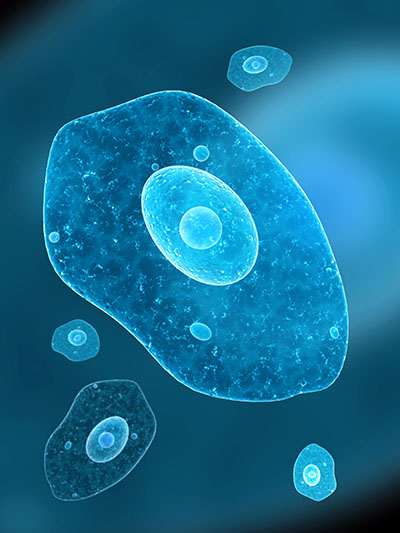
 Scene: Biology in the Bakery
Scene: Biology in the Bakery
 Reading: Dr. Otto and the Four Fatal Flaws
Reading: Dr. Otto and the Four Fatal Flaws
 Interactive: Zooming in on Yeast
Interactive: Zooming in on Yeast
 Reading: Rise of the Yeast Cells
Reading: Rise of the Yeast Cells
 Lab: The Bread Necessities of Life
Lab: The Bread Necessities of Life
 Writing: Science-Fiction Science—Grey Goo
Writing: Science-Fiction Science—Grey Goo
Unit L5 Focus Words
cell
noun – the smallest, most basic unit of a living organism able to make a copy of itself
We have trillions of cells in our bodies.
divide
verb — to split something into two or more parts
One “parent” cell divides into two independent “daughter” cells.
multiply
verb — to increase the amount, degree or number of something; to breed or generate
Yeast cells multiply every three hours or so.
fungus
noun – an organism like yeast, mold, or mushrooms that gets its nutrition from an outside source
A fungus is not an animal or plant; fungi are a kingdom onto themselves.
individual
noun – a single, separate person or thing
Individual cells cannot survive on their own, except for unicellular organisms.
reproduction
noun – making a copy of something; making another generation of individuals
Reproduction creates the next generations of a population.
separate
adjective — apart from others; not attached to or connected to
Yeast cells can survive in separate containers.
exponential
adjective — quickly growing; having a rapid rate of change
A line graph of exponential growth makes the shape of a hockey stick.
microscopic
adjective — so tiny it can only be seen with great magnification, as with a microscope
I never saw a microscopic creature before we used a microscope in science class.
nucleus
noun – the core of some cells, containing genetic material and surrounded by a membrane
An atom has a nucleus, and so does a cell. It's a word that means the core.
nutrient
noun – a source of building materials and energy, like food
A plant that does not get all the nutrients it needs will die.
fuel
noun – an energy source that feeds a living thing
Sugars are a basic fuel for many cells.
process
noun – a series of events producing a result
Photosynthesis is a process in which plants convert light energy into chemical energy.
matter
noun – substances and materials
Matter makes up everything in the universe.